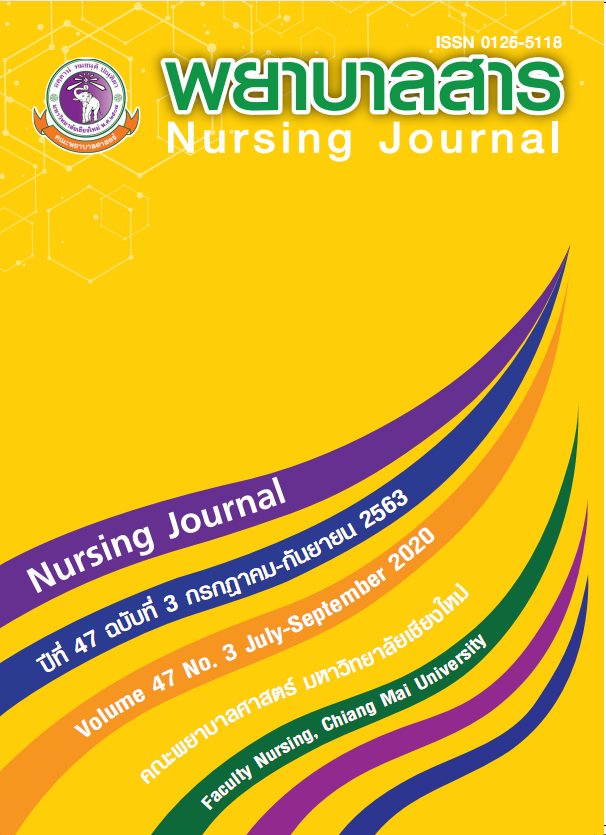Effectiveness of Implementing the Cognitive Recovery Program Among Older Patients with Schizophrenia, Suan Prung Psychiatric Hospital, Chiang Mai Province
Keywords:
Cognitive Recovery Program, Older Patients, SchizophreniaAbstract
Cognitive recovery in older patients with schizophrenia is part of psychosocial recovery, which is very important for long term care. The purpose of this operational study was to evaluate the effectiveness of implementing a cognitive recovery program among older patients with schizophrenia at Suan Prung Psychiatric Hospital, Chiang Mai Province. The sample included three nurses and seven older patients with schizophrenia from November 2016 to February 2017.The instruments used in this study consisted of 1) the information record form 2) the Thai version of Brief Psychiatric Rating Scale 3) the cognitive recovery program 4) the Thai version of the Mini Mental Status Examination 5) questionnaires on nurses’ opinions toward the cognitive recovery program 6) a satisfaction questionnaire of older patients with schizophrenia after the program . Data were analyzed by descriptive statistic.
The results revealed that after completing the cognitive recovery program among older patients with schizophrenia, the cognitive scores of older patients with schizophrenia were increased to be in the normal level, all older patients with schizophrenia satisfied a high level with the program, and nurses were satisfied with implementing this program.
The results indicate the effectiveness of the cognitive recovery program among older patients with schizophrenia. Therefore, nurses who care for older patients with schizophrenia should implement this program along with their routine care for psychosocial recovery for this specific population.
References
Chamaiphon Jansiri and Pattraphon Tungpunkum. (2011). Effectiveness of Using Training Programs on Behaviormodification in ADHD Children in Suanprung Psychiatric , Hospital Chiang Mai. Journal of Rajanagarindra Chil Development Institute, 1(2),6-28. (In Thai)
Institute of Geriatrics. ( 1999). Thai basic Brain Fitness Test (MMSE-Thai 200). Department of Medical Services, Ministry of Public Health. Bureau of Hygiene of the Elderly (2014). Guidelines for training for the elderly 420 hours course, Bangkok, Printing Factory War veterans organization. (In Thai)
Institute for Population and Social Research Mahidol University. (2014). Aging of the Thai population (2014) .Searched from http://www.oppo.opp.go.th/info/Agree%20IPSP%2010-1-57 pdf. (In Thai)
Jarainsak Aumglin and Gadsaraphon Kanbuppa. (2012). Epidemiology of Psychiatric Disorders in the Elderly who Come to Receive Services in Semahapoo Hospital. Between 2008-2012 Searched from http://www.thaidepression.com/www/km/km1post.pdf. (In Thai)
Jilarat Wirahcharat.( 2012). Brain Rehabilitation Program for Chronic Patients. Agenda for Mental Health of Thailand ,20 (3). 163-173. (In Thai)
Jutiphong Seekhonchai (2015). The Effectiveness of Using Memory Training Program in the Elderly with a Little Memory Defect Amphoe Pua Nan (Master of Nursing The sis) Graduate school Chiang Mai University. (In Thai)
Narin Muinsead.(2014). Community Participation in Health Promotion of the Elderly. Muban Tahlu, Chiang Dao, Chiang Mai Nursing,41(1),1-12. (In Thai)
National Elderly Committee. (2009). National Elderly Plan issue 2 (2002-2021) Revised version NO.1 Bangkok: Publisher Thapavnish. (In Thai)
Rogers, H., Cann, W., Cameron, D., Littlefield, L., & Lagioia, V (2003). Evaluation of the Family Intervention Service for Children Presenting with Characteristic Associated with Attention Deficit Hyperactivity Disorder. Australian e-Journal for the Advancement of Mental Health 2(3),1-10
Sirintorn Chatsarika, Chiraphon Laithamthat, Chakkrit yingsuk, Daochompoo Nakaviro, Arapinya Krairit, Wilawan Prasatathikom, Peangpon Charoenwat. (2015). Brain performance of Thai Adults and Seniors: Risk factors for deterioration. Thai Journal of Toxicology ,30(1) 41-59. (In Thai)
Sudarat Punnotok. (2011). The Results of the Recall Program Combined With Cognitive Therapy Time, Place, and Person Perceptions of Thought and Happiness in the Life of the Elderly With Dementia. (Master of Nursing Thesis And the field of Nursing for the Elderly). Graduate school Burapha University. (In Thai)
Suanprung Psychiatric Hospital , Department of Mental Health,Ministry of Public Health. 2013. Statistic of Patients with Schizophrenia. Chiang Mai: Suanprung Psychiatric Hospital. (In Thai)
Warakorn Kriangkaisakda. (2012). Application of the Neurobic Exercise Theory In Developing a Brain Training Program for Memory Restoration in Eearly Stage Dementia Patients. Research and Development science ,10(1), 11-25. (In Thai)
Wilawan Chaiwong. (2005). The Effectiveness of a Memory Training Program for the Elderly. ( Master of Nursing Thesis Geriatric Nursing Program) Graduate school. Chiang Mai University. (In Thai)
Yaowalak Oransanon and Chularat Wirakharat.(2011). Memory Training Program for Chronic Schizophrenia Patients. Journal of Srithanya Hospital,12(1), 2-8. (In Thai)
Downloads
Published
How to Cite
Issue
Section
License
บทความที่ได้รับการตีพิมพ์เป็นลิขสิทธิ์ของวารสารพยาบาลสาร
ข้อความที่ปรากฏในบทความแต่ละเรื่องในวารสารวิชาการเล่มนี้เป็นความคิดเห็นส่วนตัวของผู้เขียนแต่ละท่านไม่เกี่ยวข้องกับมหาวิทยาลัยเชียงใหม่ และคณาจารย์ท่านอื่นๆในมหาวิทยาลัยฯ แต่อย่างใด ความรับผิดชอบองค์ประกอบทั้งหมดของบทความแต่ละเรื่องเป็นของผู้เขียนแต่ละท่าน หากมีความผิดพลาดใด ๆ ผู้เขียนแต่ละท่านจะรับผิดชอบบทความของตนเองแต่ผู้เดียว






